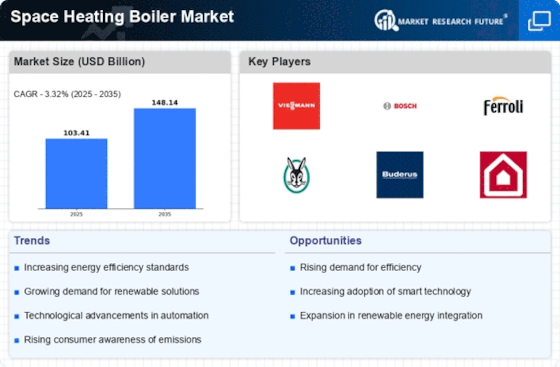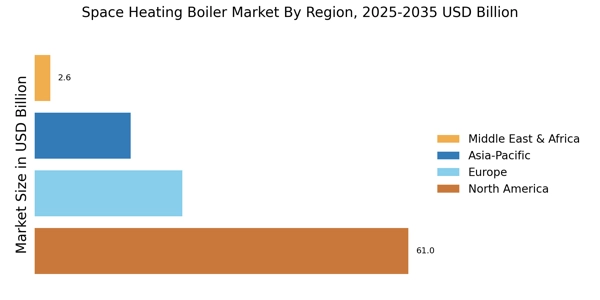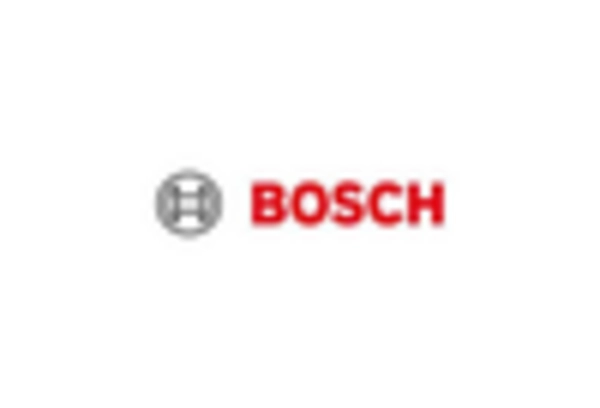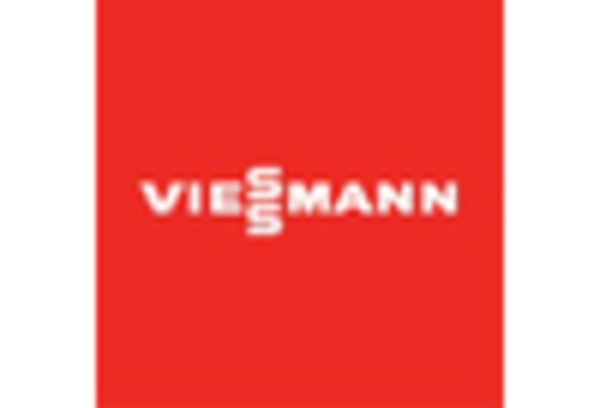Consumer Awareness and Preferences
Consumer awareness regarding energy efficiency and environmental impact is shaping the Space Heating Boiler Market. As individuals become more informed about the benefits of energy-efficient heating systems, there is a noticeable shift in purchasing preferences towards products that offer lower operational costs and reduced carbon footprints. Surveys indicate that a significant percentage of consumers prioritize energy efficiency when selecting heating solutions, which is prompting manufacturers to highlight these features in their marketing strategies. This heightened awareness is not only driving demand for advanced heating technologies but also encouraging competition among manufacturers to innovate and provide superior products. Consequently, the Space Heating Boiler Market is evolving to meet the changing preferences of consumers.
Increasing Demand for Energy Efficiency
The Space Heating Boiler Market is experiencing a notable surge in demand for energy-efficient solutions. As consumers become more environmentally conscious, there is a growing preference for heating systems that minimize energy consumption. According to recent data, energy-efficient boilers can reduce energy usage by up to 30%, which not only lowers utility bills but also contributes to reduced carbon emissions. This trend is further supported by government incentives aimed at promoting energy efficiency, which encourages homeowners and businesses to invest in modern heating technologies. Consequently, manufacturers are focusing on developing high-efficiency boilers that meet stringent energy standards, thereby driving growth in the Space Heating Boiler Market.
Rising Construction and Renovation Activities
The Space Heating Boiler Market is benefiting from a resurgence in construction and renovation activities across various sectors. As new residential and commercial buildings are constructed, there is an increasing demand for efficient heating solutions that meet modern energy standards. Moreover, the trend of retrofitting older buildings with advanced heating systems is gaining traction, as property owners seek to enhance energy efficiency and reduce operational costs. According to industry reports, the construction sector is projected to grow steadily, which will likely lead to a corresponding increase in the demand for space heating boilers. This dynamic environment presents ample opportunities for manufacturers to expand their market presence within the Space Heating Boiler Market.
Technological Advancements in Heating Systems
Technological innovation plays a pivotal role in shaping the Space Heating Boiler Market. The integration of advanced technologies, such as smart thermostats and IoT connectivity, enhances the functionality and efficiency of heating systems. These innovations allow for real-time monitoring and control, enabling users to optimize their heating schedules and reduce energy waste. Furthermore, the introduction of condensing boilers, which utilize flue gas heat recovery, has revolutionized the market by offering higher efficiency ratings. As a result, the market is witnessing a shift towards more sophisticated heating solutions that not only improve comfort but also align with sustainability goals, thereby propelling the Space Heating Boiler Market forward.
Regulatory Support for Sustainable Heating Solutions
The Space Heating Boiler Market is significantly influenced by regulatory frameworks that promote sustainable heating solutions. Governments worldwide are implementing stringent regulations aimed at reducing greenhouse gas emissions and enhancing energy efficiency. For instance, many regions have established minimum efficiency standards for heating systems, compelling manufacturers to innovate and comply with these regulations. Additionally, financial incentives, such as tax credits and rebates for energy-efficient installations, are encouraging consumers to upgrade their heating systems. This regulatory support not only fosters a competitive market environment but also drives the adoption of cleaner technologies, thereby contributing to the overall growth of the Space Heating Boiler Market.

















